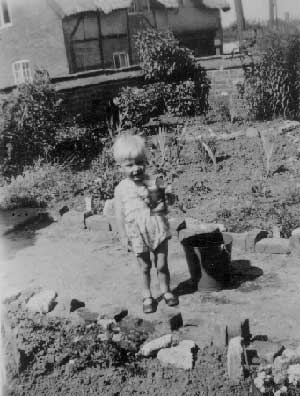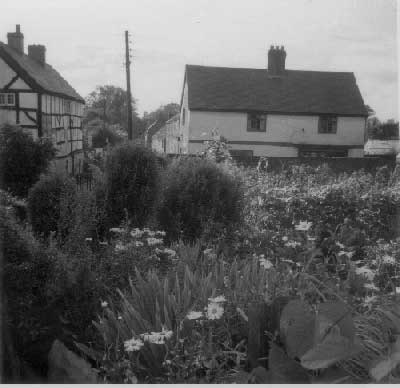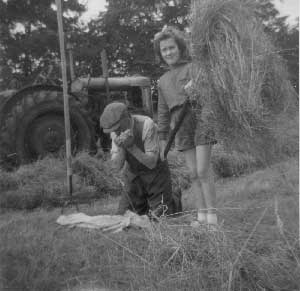Appleby History > Memories >Memories of Appleby, Allan Condie
Memories of Appleby
In the Beginning
by Allan Condie
 Me in the front garden of Hill House with the Post Office - still thatched, in the background. Click for larger image |
My mother, Evelyna Mary Rowland, was born at Red Hill Farm, Appleby Magna, on 28th September 1919. Due to the sale of Appleby Hall Estate the family, my grandparents, Uncle Henry and Maurice, later moved to Hill House, opposite the Black Horse. My great grandfather had come to Appleby Magna to take up farming, having been employed at Bass Brewery in Burton on Trent, and lived at Home Leys, on Black Horse Hill.
The farmland was scattered around the village. My mother went to Appleby School, and in due course won the scholarship and went on to Ashby Girls' Grammar School. On leaving school she spent a year’s student teaching at Ibstock Junior School and then went to Derby Women's Training College in 1938. The college was evacuated to Elvaston Castle in 1939 and the final year of the then two-year course was spent there, after which Mum went to teach in Burton on Trent. She was later to return to teach at Ibstock under Mr Harratt, but events during the war were to change things considerably.
Gopsall Hall was occupied by the military during hostilities, and a young pharmacist, Robert Alexander Condie, found himself posted to Gopsall to train as a radar instructor. He met my Mother at a New Year’s dance at the Sergeants’ Mess in Gopsall Hall – December 1943. Mum invited him back to Hill House, and the rest is history!
My parents were married at the Garrison Church in Aldershot on 17th May 1944. My mother continued to live at Appleby and teach at Ibstock. She sadly lost her first baby in November 1945. My father in the meantime had been transferred back to the Royal Army Medical Corps and given a commission, spending the latter part of the war in India. On demobilisation in 1946 my parents moved to Stirling where my father returned to work for the pharmacy where he had started his apprenticeship pre-war.
I arrived rather early in June 1947, my mum had returned to Appleby so that she could be close to Derby Womens' Hospital where she had previously been a patient. By that time my dad had left his job at Stirling and taken a position with R. Gordon Drummonds in Falkirk; so we moved to a two roomed flat in Elgin Place, Falkirk.
 A later view of the garden looking down Mawby's Lane. Click for larger image |
My sister Rosemary arrived in 1949, again she was born in Derby, but under the new National Health Service at the City Hospital. I just remember the occasion when we fetched her ‘home’ to Appleby. Transport was provided by Horace Fowkes’ Taxi and I was accompanied by my grandma and grandad’s sister Aunt Edna. I was very excited as the flags were out and I thought they were for us, not for visiting royalty. I had my first iced lolly on a stick, which due to the hot weather melted rather quickly, and Aunt Edna went to the market to procure some cheese, which was rather ‘strong’.
Summers at Appleby were the normal pattern of events until I left school at 18. Indeed I actually started school at Measham, due to the fact that my grandma had been on supply there in 1952, and Mum went down to ‘take over’ for the summer term as Dad had taken a new job in Perth, where he stayed in digs until he found us a house, and the move was made from Falkirk to Perth without us.
The normal ritual for summer holidays was to catch the overnight sleeper from Larbert and later Perth to Nuneaton Trent Valley, where we were usually met by Grandma who had engaged the services of Fowkes’ taxi. We normally had a large trunk which had to be taken in the guard’s van and trolleyed out to the car. On landing at Hill House we youngsters first activity was to go and see the animals, especially the new arrivals.
There was lots of opportunity to observe village life. When out in the village with Mum the inevitable comment from some of the residents was “Hello our Mary, don’t these two children grow!”
Highlights of the holiday were haymaking and harvest. In 1948 Granddad had purchased a Fordson Major Tractor ENR790 from Whitbys Garages at Leicester. Uncle Maurice and Dad had bought an ex Army trailer chassis at a sale at Gopsall, and set about building a suitable body for farm work on it. Blossom, the horse was still around at this time but was now virtually redundant and duly retired.
There was land up Snarestone Lane, and Measham Lane, and some fields down a lane that has now disappeared which left Snarestone Lane just before Jubilee Farm and was known as Sandy Lane. It was like the rocky road to Dublin and any movements with tractor and trailer along there had to be made in second gear. The hay was cut with an old horse mower which had the pole shortened so that it could be tractor hauled, so it still needed an operative on the seat to lift and lower the bed. Hay was turned by hand in those days, and carted loose, to be made into ricks in the stackyard.
Dad usually arrived for his fortnight’s holiday at the end of August, which meant that our stay was coming to an end soon, but could usually be found helping with the harvest, riding the binder or helping load the sheaves onto the trailer he had made.
 My sister Rosie haymaking whilst Grandad (always known to us as Pappa Tom) has a fly Woodbine. Click for larger image |
My sister Rosie and I spent hours playing across the fields nearest to Hill House, most of which have now disappeared into one great arable plot. There were the inevitable visits to local folks, the Quinneys on Black Horse Hill, Sybil Saddington and her mother on Botts Lane, the Gartons in the thatched cottage on Top Street, are a few that spring to mind.
Sunday evening I used to go to church with my grandma. While still small I would make up a pile of hassocks so that I could stand and see what was going on at Evensong. I don’t remember Parson Davis, it was Rex. Meakin who was the incumbent by the time I could understand what was going on. I found the C of E services ‘interesting’ compared with what I had now become used to in Scotland where we went to the Church of Scotland with its Presbyterian traditions. I am sure that these early introductions to the Book of Common Prayer and Hymns Ancient and Modern were to influence my later church activities.
Outings were by bus to Ashby. We usually caught the 1.40pm 697 outside the Black Horse, and returned on the ‘half past four’ as it was known in the village. We used to spend our pocket money at either Edgar Wilemans or Mrs Johnstones; a favourite was sweet cigarettes, as in those days smoking was certainly not taboo, and my grandfather was never without his Woodbines, or Uncle Maurice his Craven ‘A’. Other delicacies were liquorice sticks, but over indulgence on that score could result in too many visits to the ‘hole’ round the back. At that time there was no sewerage in Appleby. The ‘Middy Men’ came every Thursday in an Ashby UDC Dennis dustcart, which had the rear flap removed and a large bucket fitted into the back end of the body. The pans from the closets were emptied into other containers, and then tipped into the back of the cart. The resultant load was then disposed of at one time by emptying it on Fowkes’ Long Close before wiser counsels prevailed and it was taken to Packington to be processed in the sewage works!
Allan Condie, August 2012
To be continued

